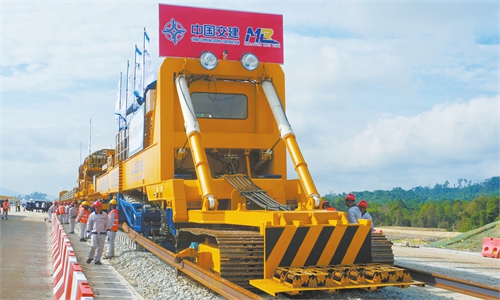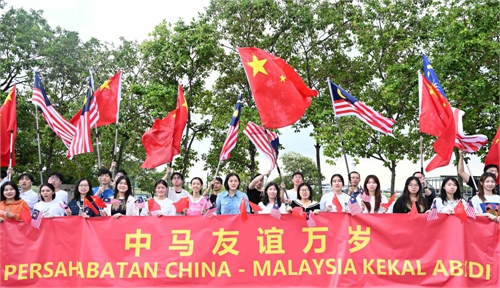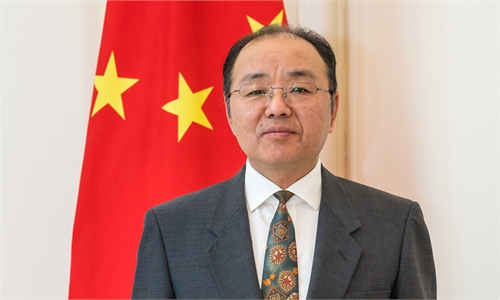
The view of Beijing (left) and Kuala Lumpur. Photo: VCG
Editor's Note:
Following a two-day visit to Vietnam, Chinese President Xi Jinping arrived in Malaysia on Tuesday on a state visit before concluding his Southeast Asian tour in Cambodia. This head-of-state diplomacy underscores China's long-term commitment to deepening all-around cooperation with neighboring countries to safeguard peace and stability in the region and beyond. "China has always emphasized the importance of maintaining good relationships with its neighbors… and this approach has gained strong support from its neighbors across Asia," Koh King Kee (Koh), president of the Centre for New Inclusive Asia, a non-government Malaysian think tank, and president of ASEAN Research Center for a Community with Shared Future, Malaysia, told Global Times (GT) reporter Li Aixin in an interview.
GT: How do you perceive the significance of President Xi's visit to Malaysia?
Koh: Malaysia and China are very close friends traditionally with a strong relationship. China has been Malaysia's largest trading partner for 16 consecutive years. After Anwar Ibrahim took office as the prime minister, he visited China three times within two years. This shows the importance he has attached to China.
The relationship between China and Malaysia is not just a normal bilateral relationship, it is much more significant than that. Both countries elevated their bilateral relationship to a comprehensive strategic partnership in 2013 and reached a consensus on jointly building a China-Malaysia community with a shared future in 2023, ushering in a new stage of their relationship.
As I mentioned in my article last year commemorating the 50th anniversary of the establishment of diplomatic ties between China and Malaysia, the China-Malaysia relationship is exemplary of China's relations with other Asian countries. It's an example of how countries should handle occasional challenges facing their relationship with neighboring countries. We should resolve such issues through dialogue and mutual understanding. That's the way neighboring countries should work together.
Malaysia and China are both Asian countries with shared values. Unlike many Western countries, we don't confront each other when we have a problem, we engage in dialogue when there are issues. And that's what matters.
Sometimes, certain countries outside the region who appear to be friends may actually pursue their own geopolitical interests in dealing with ASEAN countries. While issues may arise, China and Malaysia take a very practical approach. When we have issues, we sit down, discuss and resolve them - we don't confront each other. We seek solutions through dialogue and strongly uphold ASEAN centrality.
GT: Looking back at 2024, Xi welcomed both Malaysia's King Sultan Ibrahim Sultan Iskandar and Prime Minister Anwar in Beijing. How has the close interaction between high-level leaders of China and Malaysia influenced the bilateral relationship?
Koh: It reflects the importance both countries have placed on China-Malaysia relations. The frequency of meetings between the leaders of the two countries reinforces the political trust. This is crucial, as it makes it easier for both countries to solve problems when they arise and explore further areas of cooperation.

Koh King Kee Photo: Courtesy of Koh
GT: At a central conference on work related to neighboring countries held in Beijing last week, President Xi called for building a community with a shared future with neighboring countries. The conference stressed that China will uphold the Asian values of peace, cooperation, openness and inclusiveness. In your view, how does China's foreign policy demonstrate its commitments through concrete actions in its relations with Malaysia and other ASEAN countries?Koh: China shares land borders with 14 countries. So far, it has resolved its border issues with all of them, except India and Bhutan. China emphasizes the importance of being a good neighbor. Geography is something you can't change. China has always emphasized the importance of maintaining good relationships with its neighbors.
This is a fundamental part of its vision for building a community with a shared future for mankind. You must first apply this principle to your neighbors. So far, China has been very successful in this approach and has gained strong support from its neighbors across Asia.
China is a powerful country, and Malaysia is a middle-power country, but we respect each other. It's important for countries - especially a larger country and a middle-power or smaller country - to respect one another.
I also want to emphasize that the relationship between Malaysia and China has matured and become resilient over the years. It's resilient because we have withstood the test of time and overcome challenges together. Malaysia was one of the first ASEAN countries to establish diplomatic relations with China and that happened in 1974 during the Cold War. It was a difficult time, but we took the bold step of establishing this relationship. This also demonstrated the foresight and sincerity of Malaysian leaders in making friends with China.
GT: What is your perspective on the future potential of the China-Malaysia relationship?
Koh: The bedrock of the relationship between the two countries is the people-to-people bond. In this regard, Malaysia and China have waived visa requirements for their citizens to travel to each other's countries, thus promoting this bond. Additionally, there is a significant number of Chinese citizens living in Malaysia, including those who are working and studying here. Chinese citizens hold the highest number of permits under the Malaysia My Second Home long-term visa program, which allows them to stay in Malaysia for up to 10 years.
Economic relations are also crucial. China has been Malaysia's largest trading partner for the past 16 years, and this will continue. With the current tariffs imposed by the US, I believe both countries will grow even closer economically as Chinese companies and multinationals may move part of their production facilities to Malaysia.
Malaysia and China complement each other economically. For example, Malaysia is one of the largest producers of semiconductors, which is also one of Malaysia's largest exports to China. China then adds value to these semiconductors, turning them into finished products and exporting them to other countries.
The East Coast Rail Link (ECRL), which is being built by the China Communications Construction Company, is expected to be completed next year. This project will vastly improve transportation links between the east coast and the west coast of Peninsular Malaysia.
When China builds infrastructure, such as ports, it often implements the "port and park" strategy. This means that when it builds a port, it also develops an industrial park to make it economically viable.
Likewise, with the ECRL, I think it would be a great idea for China to cooperate with local authorities and entrepreneurs to develop industrial parks along the rail link.
GT: How can China and its neighbors work together to make the ASEAN region a model of cooperation, preventing it from becoming a battleground for great power rivalry?
Koh: There is no doubt that certain powers outside the region may wish to turn the South China Sea into a battleground for big power rivalry, and it does not hide this fact. However, we should avoid this. China and some Southeast Asian countries do have some territorial disputes over the South China Sea, but China has emphasized that countries involved should put aside their differences and focus on jointly developing the disputed islands to benefit each other.
We should turn the South China Sea into a sea of cooperation and friendship, not a sea of conflict.
Malaysia is the rotating chair of ASEAN this year. Malaysia should grab this opportunity to play an active role in advancing China-ASEAN cooperation. For example, Version 3.0 of the China-ASEAN Free Trade Agreement, which is almost ready, should be implemented as soon as possible.



